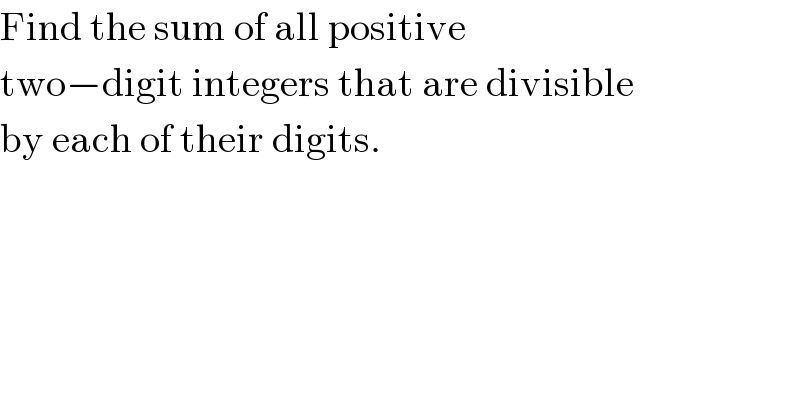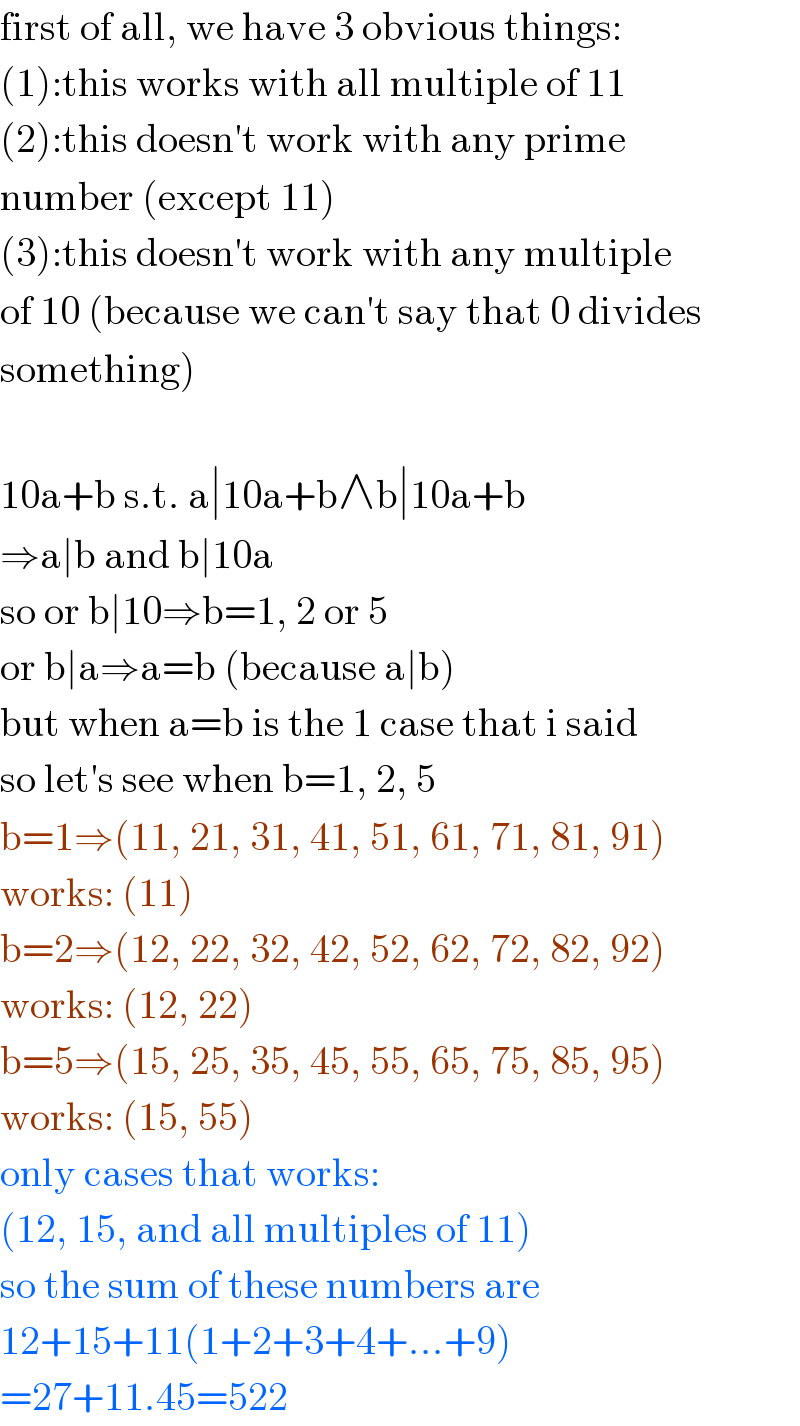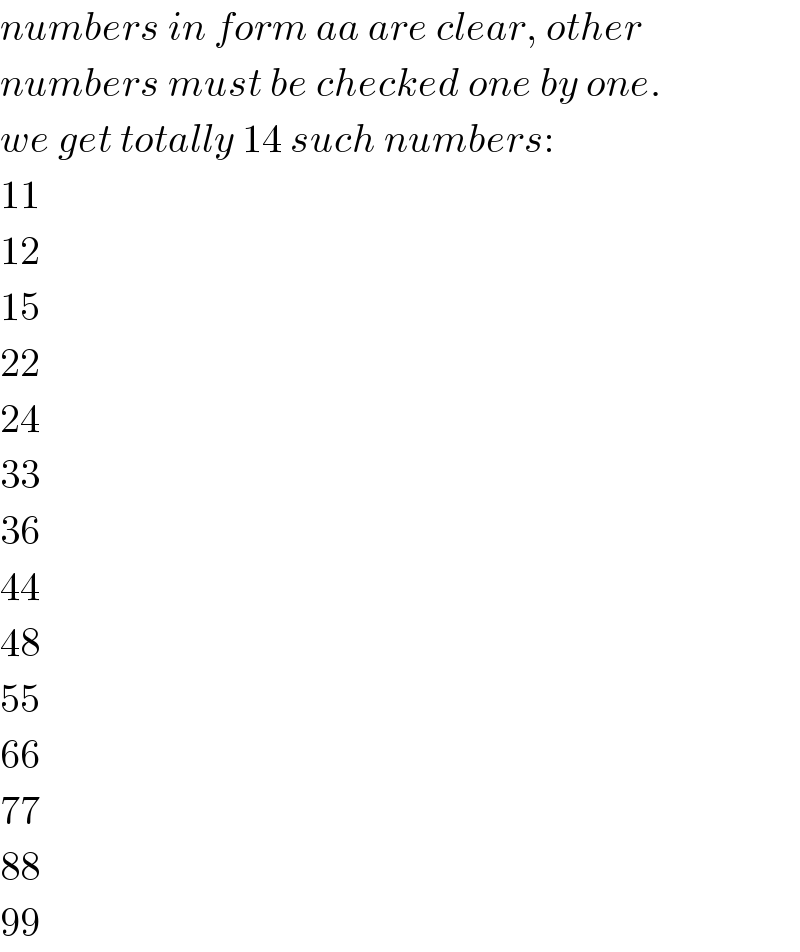
Question Number 110591 by Aina Samuel Temidayo last updated on 29/Aug/20

$$\mathrm{Find}\:\mathrm{the}\:\mathrm{sum}\:\mathrm{of}\:\mathrm{all}\:\mathrm{positive} \\ $$$$\mathrm{two}−\mathrm{digit}\:\mathrm{integers}\:\mathrm{that}\:\mathrm{are}\:\mathrm{divisible} \\ $$$$\mathrm{by}\:\mathrm{each}\:\mathrm{of}\:\mathrm{their}\:\mathrm{digits}. \\ $$
Answered by Rasheed.Sindhi last updated on 30/Aug/20
![Let N=10t+u is a number such that u ∣ 10t+u ∧ t ∣ 10t+u 10t+u=mu ∧ 10t+u=nt (N is common multiple of m & n) u=((10t)/(m−1)) ∧ u=t(n−10) ((10t)/(m−1))=t(n−10) t≠0(∵ The number is of 2-digit) ((10)/(m−1))=n−10 (m−1)(n−10)=10 m−1=a ∧ n−10=10/a [ Where a ∣ 10 ] ( m,n)=(a+1,10+((10)/a)) As N=common multiple of m & n or a+1 & 10+((10)/a). So, N=k lcm(a+1,10+((10)/a)) for some k (∈N) Four possible cases ^(★1) m−1=1 ∧ n−10=10 (m,n)=(2,20) N=k lcm(2,20) N=20^(×) ,40^(×) ,60^(×) ,80^(×) (No value of N) ^(★2) m−1=2 ∧ n−10=5 (m,n)=(3,15) N=klcm(3,15) N=15,30^(×) ,45^(×) ,60^(×) ,75^(×) ,90^(×) ^(★3) m−1=5 ∧ n−10=2 (m,n)=(6,12) N=klcm(12,6) N=12,24,36,48,60^(×) ,72^(×) ,84^(×) ,96^(×) ^(★4) m−1=10 ∧ n−10=1 (m,n)=(11,11) N=klcm(11,11) N=11,22,33,44,55,66,77,88,99 Red numbers are successful.](Q110609.png)
$${Let}\:{N}=\mathrm{10}{t}+{u}\:{is}\:{a}\:{number}\:{such} \\ $$$${that}\:{u}\:\mid\:\mathrm{10}{t}+{u}\:\wedge\:{t}\:\mid\:\mathrm{10}{t}+{u} \\ $$$$\:\:\:\:\:\:\mathrm{10}{t}+{u}={mu}\:\wedge\:\mathrm{10}{t}+{u}={nt} \\ $$$$\:\left({N}\:{is}\:{common}\:{multiple}\:{of}\:{m}\:\&\:{n}\right) \\ $$$$\:\:\:\:\:\:\:{u}=\frac{\mathrm{10}{t}}{{m}−\mathrm{1}}\:\wedge\:{u}={t}\left({n}−\mathrm{10}\right) \\ $$$$\:\:\:\:\:\:\:\:\:\frac{\mathrm{10}{t}}{{m}−\mathrm{1}}={t}\left({n}−\mathrm{10}\right) \\ $$$${t}\neq\mathrm{0}\left(\because\:{The}\:{number}\:{is}\:{of}\:\mathrm{2}-{digit}\right) \\ $$$$\:\:\:\:\:\:\:\:\:\:\:\:\:\:\frac{\mathrm{10}}{{m}−\mathrm{1}}={n}−\mathrm{10} \\ $$$$\:\:\:\left({m}−\mathrm{1}\right)\left({n}−\mathrm{10}\right)=\mathrm{10} \\ $$$$\:\:\:\:\:\:\:\:\:\:{m}−\mathrm{1}={a}\:\wedge\:{n}−\mathrm{10}=\mathrm{10}/{a} \\ $$$$\:\:\:\:\:\:\:\:\:\:\:\:\:\:\left[\:{Where}\:{a}\:\mid\:\mathrm{10}\:\right] \\ $$$$\:\:\:\:\:\:\:\:\left(\:{m},{n}\right)=\left({a}+\mathrm{1},\mathrm{10}+\frac{\mathrm{10}}{{a}}\right) \\ $$$${As}\:{N}={common}\:{multiple}\:{of}\:{m}\:\&\:{n} \\ $$$${or}\:{a}+\mathrm{1}\:\&\:\mathrm{10}+\frac{\mathrm{10}}{{a}}.\: \\ $$$${So}, \\ $$$${N}={k}\:\mathrm{lcm}\left({a}+\mathrm{1},\mathrm{10}+\frac{\mathrm{10}}{{a}}\right)\:\mathrm{for}\:\mathrm{some}\:\mathrm{k} \\ $$$$\left(\in\mathbb{N}\right) \\ $$$${Four}\:{possible}\:{cases} \\ $$$$\:^{\bigstar\mathrm{1}} \:{m}−\mathrm{1}=\mathrm{1}\:\wedge\:{n}−\mathrm{10}=\mathrm{10} \\ $$$$\:\:\:\:\:\:\:\:\:\left({m},{n}\right)=\left(\mathrm{2},\mathrm{20}\right) \\ $$$$\:\:\:\:\:\:\:\:\:{N}={k}\:\mathrm{lcm}\left(\mathrm{2},\mathrm{20}\right) \\ $$$$\:\:\:\:\:{N}=\overset{×} {\mathrm{20}},\overset{×} {\mathrm{40}},\overset{×} {\mathrm{60}},\overset{×} {\mathrm{80}}\:\left({No}\:{value}\:{of}\:{N}\right) \\ $$$$\:^{\bigstar\mathrm{2}} {m}−\mathrm{1}=\mathrm{2}\:\wedge\:{n}−\mathrm{10}=\mathrm{5} \\ $$$$\:\:\:\:\:\:\:\:\:\left({m},{n}\right)=\left(\mathrm{3},\mathrm{15}\right) \\ $$$$\:\:\:\:\:\:\:\:\:{N}={k}\mathrm{lcm}\left(\mathrm{3},\mathrm{15}\right) \\ $$$$\:\:\:\:\:\:\:{N}=\mathrm{15},\overset{×} {\mathrm{30}},\overset{×} {\mathrm{45}},\overset{×} {\mathrm{60}},\overset{×} {\mathrm{75}},\overset{×} {\mathrm{90}} \\ $$$$\:^{\bigstar\mathrm{3}} {m}−\mathrm{1}=\mathrm{5}\:\wedge\:{n}−\mathrm{10}=\mathrm{2} \\ $$$$\:\:\:\:\:\:\:\:\:\:\left({m},{n}\right)=\left(\mathrm{6},\mathrm{12}\right) \\ $$$$\:\:\:\:\:\:\:\:\:\:\:\:\:{N}={klcm}\left(\mathrm{12},\mathrm{6}\right) \\ $$$$\:\:\:\:{N}=\mathrm{12},\mathrm{24},\mathrm{36},\mathrm{48},\overset{×} {\mathrm{60}},\overset{×} {\mathrm{72}},\overset{×} {\mathrm{84}},\overset{×} {\mathrm{96}} \\ $$$$\:^{\bigstar\mathrm{4}} {m}−\mathrm{1}=\mathrm{10}\:\wedge\:{n}−\mathrm{10}=\mathrm{1} \\ $$$$\:\:\:\:\:\:\:\:\:\:\:\left({m},{n}\right)=\left(\mathrm{11},\mathrm{11}\right) \\ $$$$\:\:\:\:\:\:\:\:\:\:{N}={k}\mathrm{lcm}\left(\mathrm{11},\mathrm{11}\right) \\ $$$$\:\:\:{N}=\mathrm{11},\mathrm{22},\mathrm{33},\mathrm{44},\mathrm{55},\mathrm{66},\mathrm{77},\mathrm{88},\mathrm{99} \\ $$$$\:\:{Red}\:{numbers}\:{are}\:{successful}. \\ $$
Commented by Aina Samuel Temidayo last updated on 29/Aug/20

$$\mathrm{Thanks}\:\mathrm{but}\:\mathrm{please}\:\mathrm{try}\:\mathrm{to}\:\mathrm{complete}\:\mathrm{it}.\:\mathrm{I} \\ $$$$\mathrm{post}\:\mathrm{questions}\:\mathrm{because}\:\mathrm{I}\:\mathrm{don}'\mathrm{t}\:\mathrm{really}\:\mathrm{have}\:\mathrm{any}\:\mathrm{idea} \\ $$$$\mathrm{of}\:\mathrm{how}\:\mathrm{to}\:\mathrm{solve}\:\mathrm{them}. \\ $$
Commented by Rasheed.Sindhi last updated on 30/Aug/20

$${Completed}\:{the}\:{answer} \\ $$
Answered by floor(10²Eta[1]) last updated on 29/Aug/20

$$\mathrm{first}\:\mathrm{of}\:\mathrm{all},\:\mathrm{we}\:\mathrm{have}\:\mathrm{3}\:\mathrm{obvious}\:\mathrm{things}: \\ $$$$\left(\mathrm{1}\right):\mathrm{this}\:\mathrm{works}\:\mathrm{with}\:\mathrm{all}\:\mathrm{multiple}\:\mathrm{of}\:\mathrm{11} \\ $$$$\left(\mathrm{2}\right):\mathrm{this}\:\mathrm{doesn}'\mathrm{t}\:\mathrm{work}\:\mathrm{with}\:\mathrm{any}\:\mathrm{prime}\: \\ $$$$\mathrm{number}\:\left(\mathrm{except}\:\mathrm{11}\right) \\ $$$$\left(\mathrm{3}\right):\mathrm{this}\:\mathrm{doesn}'\mathrm{t}\:\mathrm{work}\:\mathrm{with}\:\mathrm{any}\:\mathrm{multiple} \\ $$$$\mathrm{of}\:\mathrm{10}\:\left(\mathrm{because}\:\mathrm{we}\:\mathrm{can}'\mathrm{t}\:\mathrm{say}\:\mathrm{that}\:\mathrm{0}\:\mathrm{divides}\right. \\ $$$$\left.\mathrm{something}\right) \\ $$$$ \\ $$$$\mathrm{10a}+\mathrm{b}\:\mathrm{s}.\mathrm{t}.\:\mathrm{a}\mid\mathrm{10a}+\mathrm{b}\wedge\mathrm{b}\mid\mathrm{10a}+\mathrm{b} \\ $$$$\Rightarrow\mathrm{a}\mid\mathrm{b}\:\mathrm{and}\:\mathrm{b}\mid\mathrm{10a} \\ $$$$\mathrm{so}\:\mathrm{or}\:\mathrm{b}\mid\mathrm{10}\Rightarrow\mathrm{b}=\mathrm{1},\:\mathrm{2}\:\mathrm{or}\:\mathrm{5} \\ $$$$\mathrm{or}\:\mathrm{b}\mid\mathrm{a}\Rightarrow\mathrm{a}=\mathrm{b}\:\left(\mathrm{because}\:\mathrm{a}\mid\mathrm{b}\right) \\ $$$$\mathrm{but}\:\mathrm{when}\:\mathrm{a}=\mathrm{b}\:\mathrm{is}\:\mathrm{the}\:\mathrm{1}\:\mathrm{case}\:\mathrm{that}\:\mathrm{i}\:\mathrm{said} \\ $$$$\mathrm{so}\:\mathrm{let}'\mathrm{s}\:\mathrm{see}\:\mathrm{when}\:\mathrm{b}=\mathrm{1},\:\mathrm{2},\:\mathrm{5} \\ $$$$\mathrm{b}=\mathrm{1}\Rightarrow\left(\mathrm{11},\:\mathrm{21},\:\mathrm{31},\:\mathrm{41},\:\mathrm{51},\:\mathrm{61},\:\mathrm{71},\:\mathrm{81},\:\mathrm{91}\right) \\ $$$$\mathrm{works}:\:\left(\mathrm{11}\right) \\ $$$$\mathrm{b}=\mathrm{2}\Rightarrow\left(\mathrm{12},\:\mathrm{22},\:\mathrm{32},\:\mathrm{42},\:\mathrm{52},\:\mathrm{62},\:\mathrm{72},\:\mathrm{82},\:\mathrm{92}\right) \\ $$$$\mathrm{works}:\:\left(\mathrm{12},\:\mathrm{22}\right) \\ $$$$\mathrm{b}=\mathrm{5}\Rightarrow\left(\mathrm{15},\:\mathrm{25},\:\mathrm{35},\:\mathrm{45},\:\mathrm{55},\:\mathrm{65},\:\mathrm{75},\:\mathrm{85},\:\mathrm{95}\right) \\ $$$$\mathrm{works}:\:\left(\mathrm{15},\:\mathrm{55}\right) \\ $$$$\mathrm{only}\:\mathrm{cases}\:\mathrm{that}\:\mathrm{works}: \\ $$$$\left(\mathrm{12},\:\mathrm{15},\:\mathrm{and}\:\mathrm{all}\:\mathrm{multiples}\:\mathrm{of}\:\mathrm{11}\right) \\ $$$$\mathrm{so}\:\mathrm{the}\:\mathrm{sum}\:\mathrm{of}\:\mathrm{these}\:\mathrm{numbers}\:\mathrm{are} \\ $$$$\mathrm{12}+\mathrm{15}+\mathrm{11}\left(\mathrm{1}+\mathrm{2}+\mathrm{3}+\mathrm{4}+...+\mathrm{9}\right) \\ $$$$=\mathrm{27}+\mathrm{11}.\mathrm{45}=\mathrm{522} \\ $$
Commented by Aina Samuel Temidayo last updated on 30/Aug/20

$$\mathrm{Thanks}\:\mathrm{but}\:\mathrm{I}\:\mathrm{don}'\mathrm{t}\:\mathrm{think}\:\mathrm{this}\:\mathrm{is} \\ $$$$\mathrm{correct}. \\ $$
Commented by floor(10²Eta[1]) last updated on 30/Aug/20

$$?????\mathrm{why} \\ $$
Answered by mr W last updated on 30/Aug/20

$${numbers}\:{in}\:{form}\:{aa}\:{are}\:{clear},\:{other} \\ $$$${numbers}\:{must}\:{be}\:{checked}\:{one}\:{by}\:{one}. \\ $$$${we}\:{get}\:{totally}\:\mathrm{14}\:{such}\:{numbers}: \\ $$$$\mathrm{11} \\ $$$$\mathrm{12} \\ $$$$\mathrm{15} \\ $$$$\mathrm{22} \\ $$$$\mathrm{24} \\ $$$$\mathrm{33} \\ $$$$\mathrm{36} \\ $$$$\mathrm{44} \\ $$$$\mathrm{48} \\ $$$$\mathrm{55} \\ $$$$\mathrm{66} \\ $$$$\mathrm{77} \\ $$$$\mathrm{88} \\ $$$$\mathrm{99} \\ $$
